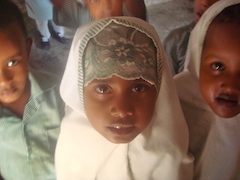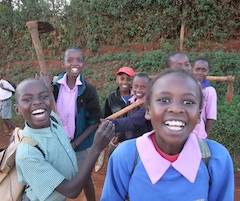ARC begins major new programme in sub-Saharan Africa
March 14, 2011:
 |
 |
 |
Muslim schoolchildren in Mombasa, Kenya |
ARC is embarking upon a major new programme in sub-Saharan Africa, working alongside key Muslim and Christian leaders who have committed to develop long-term environmental action plans to protect the living planet.
The leaders, who between them are responsible for millions of followers, are meeting in Nairobi, Kenya, later this month for a two-day conference organised by ARC and co-hosted by the All Africa Conference of Churches, an ecumenical body representing more than 120 million Christians in 39 African countries.
Delegates to the Nairobi meeting include faith leaders from Cameroon, Ethiopia, Ghana, Kenya, Nigeria, Rwanda, South Africa, Sudan, Tanzania, Uganda and Zimbabwe.
Inspired by 31 faith groups which announced long-term action plans on the environment at ARC’s Windsor Celebration in November 2009, the Muslim and Christian leaders are embarking on their own plans to support their communities, many of whom are already experiencing the effects of climate change and other environmental crises.
 |
 |
 |
Children carrying hoes, Kairi, Kenya |
Sustainable land and waterThe Nairobi meeting will focus on sustainable land and water management, with a particular emphasis on forestry, food, farming and education. It has been made possible through funding from the Norwegian Government and the US Agency for International Development (USAID).
The meeting marks the beginning of USAID Africa’s engagement with ARC and is also part of a bigger programme of work on sustainable land and water management in Africa which ARC has been asked to undertake by the World Bank. The involvement of two such key agencies indicates the growing recognition of the importance of working with the faiths to tackle environmental degradation and climate change.
USAID works with faith-based institutions for secular purposes across environment, health, agriculture, education and other sectors, and is working to promote and increase the practice.
A matter of life and deathIn Africa, adaption and mitigation are not just buzz words but a matter of life and death. Climate change is predicted to deal a devastating blow to a continent already suffering more than its fair share of poverty and malnutrition. According to the Intergovernmental Panel on Climate Change, yields from rain-fed agriculture could be reduced by up to 50 per cent by 2020 in some African countries.
With more than 90 per cent of the continent’s population describing themselves as either Christian or Muslim, the faiths have a pivotal role to play in Africa, as landowners, educators and sustainers of community.
Perhaps most important of all, they are also some of the most influential voices on the continent, as the Kenyan Minister for Agriculture, Dr Wilson Songa, himself acknowledged recently, when he admitted that farmers trust faith leaders more than the government.
Engaging faith communitiesThe US Agency for International Development (USAID) has released a White Paper, From Practice to Policy to Practice: Connecting Faith and Conservation in Africa. In an effort to better engage faith communities in conservation in sub-Saharan Africa, the paper explores the current practices of connecting faith and conservation, provides information on the faith groups doing conservation work, and presents several examples on faith-based conservation.
It can be found here.
|

